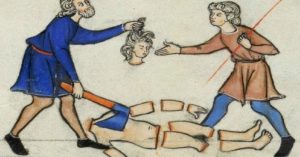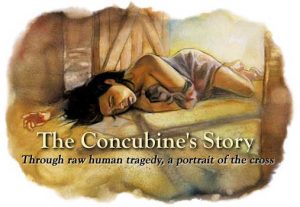
Shownotes
Wisdom-Trek / Creating a Legacy
Welcome to Day 881 of our Wisdom-Trek, and thank you for joining me.
I am Guthrie Chamberlain, Your Guide to Wisdom
The Most Horrific Bible Story – Wisdom Wednesday

Thank you for joining us for our five days per week wisdom and legacy building podcast. Today is Day 881 of our trek, and it is Wisdom Wednesday. Creating a Biblical Worldview is important in order to have a proper perspective on today’s current events. To establish a Biblical worldview, it is required that you also have a proper understanding of God’s Word.
Especially in our western cultures, we do not fully understand the Scriptures from the mindset and culture of the authors. In order help us to all have a better understanding of some of the more obscure passages in God’s word, we are investing Wisdom Wednesday reviewing a series of essays from one of today’s most prominent Hebrew Scholars Dr. Micheal S. Heiser. He has compiled these essays into a book titled I Dare You Not to Bore Me with the Bible.
We are broadcasting from our studio at The Big House in Marietta, Ohio. One factor that supports the authenticity of God’s Word is that it includes narrative of the good, the bad, and the ugly. In today’s essay, we will take a closer look at one of the stories that is both bad and ugly but also leads us to a truth that we need to understand. In today’s essay from Dr. Heiser, we want to explore Judges 19-20 where God’s Word presents a tale that is considered…
The Most Horrific Bible Story

“In those days, there was no king in Israel.” This line, repeated throughout Judges, frames the horrific tale of the Levite and his concubine. The grim details of this story showcase the anarchy and spiritual decay of the period, but this story is not just a cheap thriller.
When reading this story, our attention fixates on the grim details of murder, rape, war, and abduction. But there are crucial, less repugnant elements that include tribal affiliations and the locations of events. The story was designed to prompt readers into favoring kingship, the people needed a Messiah, a savior.
The book of Judges does not name its author: it was likely written after the time of David. All of these elements add up to not only a rationale for kingship—but a polemic for the superiority of a king from Judah (David), not Benjamin (Saul) or Ephraim.
By the time Judges was being written, Saul had already failed God as a spiritual leader. Anyone reading the story would be prompted to follow God’s new choice of kingship, the line of David. Any other ruler would spell chaos, evil and tragedy. I am going to summarize this passage, but I would encourage you to read Judges 19-20 to get the full spectrum of this horrific story, which is a precursor to the kings of Israel and culminates in Jesus Christ as the King of Kings.

| The Events in the Story | What Does This Teach Us? |
| In Judges 19-20 a Levite is retrieving his fugitive concubine from her father’s house in Bethlehem, located in the tribal territory of Judah.
The concubine’s father, who is from Judah, treats the Levite with warm hospitality. |
The Levite is shown warm hospitality in Judah, David’s tribe. |
| The Levite and his concubine travel home to Ephraim. On the way, he has the option to stay in the city of Jebus, a Benjamite territory.
He decides not to remain since Jebus is under the rule of Gentiles, non-Hebrews. |
The Levite could have stopped in Jebus—which is later known as Jerusalem. It is a missed oasis in the hellish sea of Benjamin. |
| He journeys on to Gibeah, also a Benjamite territory. In Gibeah, an old man—also from Ephraim—offers refuge to the Levite and his concubine ([19:15]-16).
A throng of wicked men surround the old man’s house and demand that the Levite be surrendered to them so they could molest him. |
The Benjamite rapists of Gibeah are clearly wicked. Saul, the first king of Israel, belonged to the tribe of Benjamin. |
| The old man offers his virgin daughter and the Levite’s concubine to them to avoid their disgraceful demand, but they refuse ([19:23]-25).
The Levite forces his concubine outside to satisfy them. He finds her dead at the door of the house the next morning. Without a hint of remorse or compassion, he piles her on his donkey ([19:25]-28). |
The Levite, from Ephraim, is a villain. Ephraim is associated with the renegade northern kingdom of Israel that forsook the line of God’s anointed, David. The old man, also from Ephraim, is yet another villain. |
| After arriving home, the Levite cuts her body into 12 pieces and sends a piece to each Israelite tribal territory. He is summoning tribal leadership to meet and decide on retaliation ([19:29]-20:7).
All the tribes are outraged, except one. The tribe leaders of Benjamin, in whose territory Gibeah is located, boycott the assembly and refuse to surrender the men of Gibeah (20:2-3, 12-13). The result is a fratricidal war, and all but 600 men of Benjamin are annihilated ([20:14]-48). |
The Benjamite leaders that refuse to attend the tribal assembly and turn over the men of Gibeah are wicked. |

The appalling nature of this story provides an appropriate context for God’s plan of redemption. It sets the worst of human nature against the need for divine rule. That would come in Old Testament times in the form of David, the chosen king, the man after God’s own heart. From David, God would produce the King of Kings, Jesus, whose mission was to save all humanity, not just Israel, from the curse of sin.
QUICK BIT: This story mirrors the events in Genesis 19. The men of Sodom surrounded Lot’s house and demanded the visiting men—actually angels—be handed over. Lot offered his two virgin daughters instead. Because of their wickedness, Sodom was destroyed. Does this mean that God will destroy Gibeah too? The story shows the dire need for a king. Not just any king though, but the King of Kings through the tribe of Judah, not Benjamin.
Next Wisdom Wednesday we will continue with the Old Testament as we look at Dr. Heiser’s next essay titled “Righting a Wrong.” I believe you will find this another interesting topic to consider as we build our Biblical Worldview.
Tomorrow we will continue with our 3-minute humor nugget that will provide you with a bit of cheer and help you to lighten up and live a rich and satisfying life. So encourage your friends and family to join us and then come along with us tomorrow for another day of our Wisdom-Trek, Creating a Legacy.

If you would like to listen to any of our past 880 treks or read the Wisdom Journal, they are available at Wisdom-Trek.com. I encourage you to subscribe to Apple Podcast or Google Play so that each day’s trek will be downloaded automatically.
Thank you so much for allowing me to be your guide, mentor, and most of all your friend as I serve you through the Wisdom-Trek podcast and journal.
As we take this trek together, let us always:
- Live Abundantly (Fully)
- Love Unconditionally
- Listen Intentionally
- Learn Continuously
- Lend to others Generously
- Lead with Integrity
- Leave a Living Legacy Each Day
I am Guthrie Chamberlain reminding you to Keep Moving Forward, Enjoy Your Journey, and Create a Great Day Everyday! See you tomorrow!